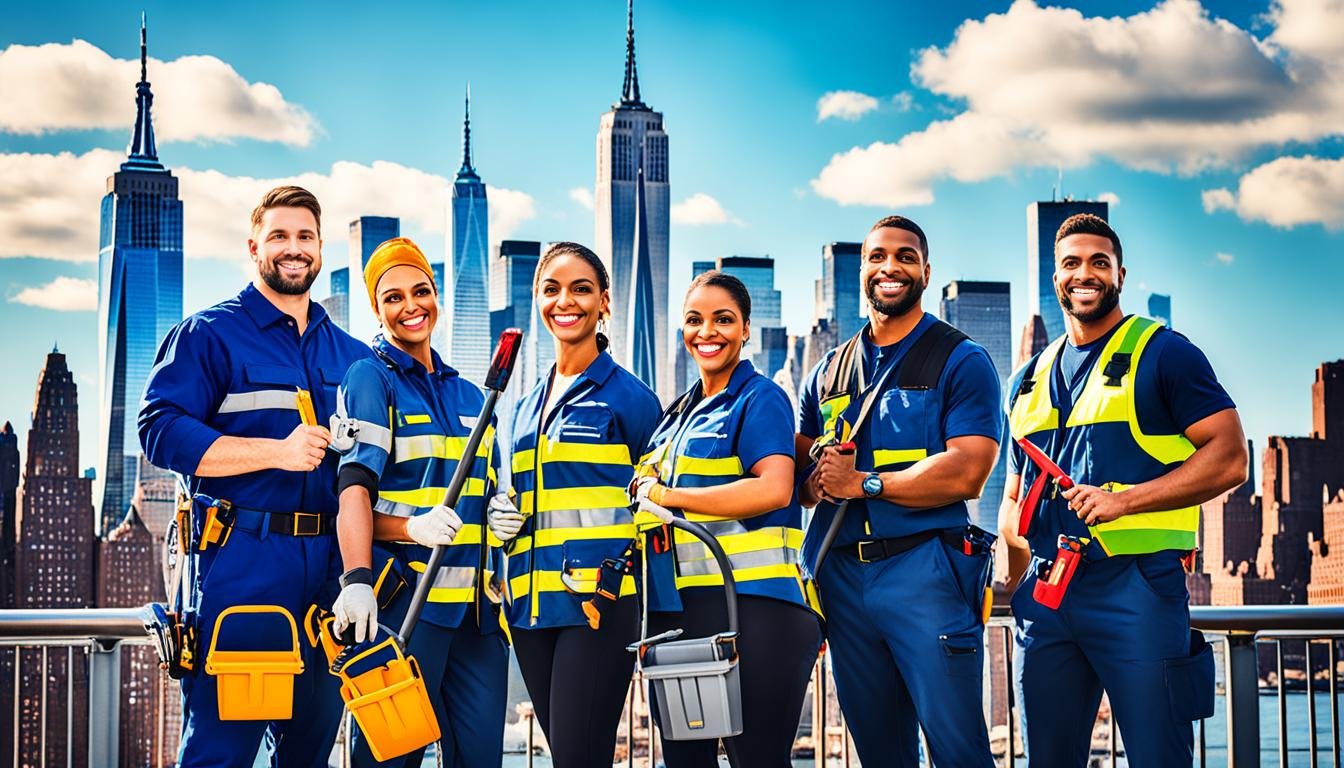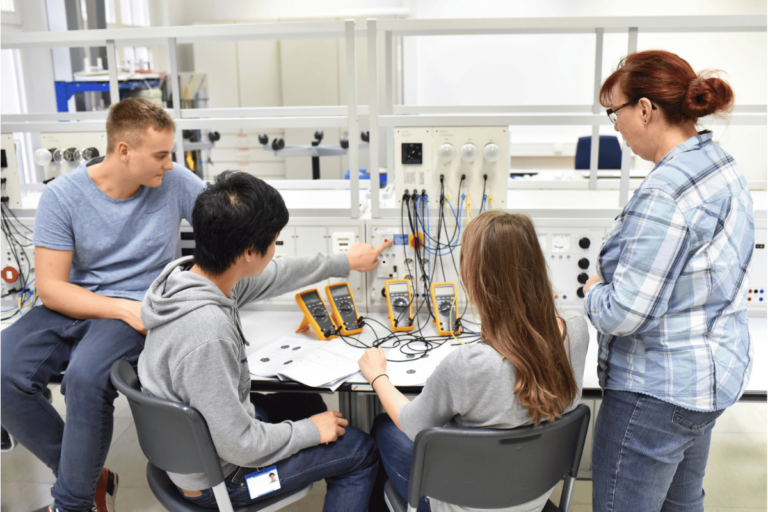Did you know over 70% of employers in New York City want candidates with special skills? This shows how important vocational training is in NYC. It’s a key way for people to get better jobs. With many vocational training programs, people can learn the skills they need for real jobs.
These programs offer everything from weekend courses to full career development series. They help people improve their careers and help the local economy grow.
Key Takeaways
- Vocational training programs are vital for meeting the skills demand in NYC’s job market.
- Intensive weekend courses help professionals balance learning with daily commitments.
- Participants in Career Skills Development Series earn digital badges and certificates.
- Notable institutions like LaGuardia and Kingsborough Community Colleges offer high-rated programs.
- Courses cover various topics like digital marketing and customer service, enhancing career opportunities.
The Importance of Vocational Training in Today’s Job Market
New York City’s job market is changing fast, making vocational training more important than ever. There’s a big need for skilled workers in many areas. Vocational training gives people the hands-on skills they need for jobs in growing industries.
Understanding the Shift in Workforce Demands
Many industries are crying out for trained professionals. Fields like tech, healthcare, and construction are growing fast but can’t find enough skilled people. About two-thirds of New York’s 70 Career and Technical Education (CTE) programs focus on these areas. This shows a big change in training to meet the job market’s needs, highlighting the key role of vocational training in NYC.
Benefits of Vocational Training for Job Seekers
Vocational training offers big benefits for job seekers. It makes people more employable by giving them skills needed for certain jobs. Many programs focus on middle-skill jobs, which are a big part of the job market and don’t always require a college degree. This makes it easier for people to get into these jobs and helps solve the shortage of skilled workers in New York.
Also, vocational training can lead to higher pay. Jobs like electricians and chefs are expected to grow a lot, which is good for the local economy.
| Job Role | Projected Growth Rate (2018-2028) |
|---|---|
| Electricians | 10%+ |
| HVAC Specialists | 10%+ |
| Broadcast and Sound Engineers | 10%+ |
| Plumbers | 10%+ |
| Chefs and Head Cooks | 10%+ |
Vocational training is changing to meet industry needs and help with economic growth. By getting involved in these programs, people can build lasting careers and help New York’s economy grow.
Overview of Vocational Programs in New York
New York City has many vocational programs for those wanting to learn new skills. These programs focus on areas like healthcare, technology, trades, and legal fields. Students get both practical and theoretical knowledge, making them ready for jobs after they finish.
Types of Vocational Programs Available in NYC
New York City offers a wide range of vocational training. Here are some key areas:
- Culinary Arts
- Information Technology
- Healthcare Professions
- Construction Trades
- Automotive Technology
Most vocational programs take one to two years to finish. This is faster than a traditional four-year college. Many schools offer flexible options like online and accelerated courses to help students balance school with life.
Notable Vocational Schools in NYC
Some vocational schools in NYC are known for their strong programs and high job placement rates:
- Fashion Institute of Technology
- New York City College of Technology
- Borough of Manhattan Community College
- Suffolk County Community College
- Nassau Community College
These schools offer certifications and degrees that match industry needs. They focus on practical training and classroom learning. This prepares students well for their future careers. With the right accreditation, these schools ensure their programs meet job market standards.
Vocational Training in NYC: A Closer Look
The world of vocational education in New York is changing all the time. It offers a wide range of training to fit different industries. This makes sure students are ready for the job world. Schools use new ways to teach that make learning better.
Curricula and Training Techniques Used
Vocational programs focus on real-world skills. Students get hands-on experience in their chosen fields. They learn through different methods, such as:
- Project-based learning that makes students work on real projects.
- Simulations for safe practice.
- Collaborative projects for teamwork and solving problems.
Programs like Year Up and NPower offer free training in important areas like IT and business. They give students a full curriculum to prepare them for today’s jobs.
Partnerships with Local Industries and Employers
Working with local industries is key to vocational education in New York. Schools and businesses work together to make sure training meets employer needs. Programs like Job Corps and the Bronx Design and Construction Academy show how this works.
- Internships to boost work experience.
- Advice from industry leaders on needed skills.
- Help with finding jobs.
Groups like JobsFirstNYC focus on matching skills with job needs. These partnerships link training with jobs, making sure graduates fit into the local job market.
How to Choose the Right Vocational Training Program
Choosing the right vocational training program is key to long-term career success. Start by looking at your skills and setting clear career goals. This ensures the training in NYC matches your dreams. Knowing all about the program helps you make a smart choice.
Assessing Your Skills and Career Goals
Before you sign up, take time to think about your skills and career goals. Ask yourself these questions:
- What are my strengths and weaknesses?
- Which skills do I want to develop further?
- What type of work environment excites me?
There are many vocational training programs, from automotive tech to healthcare. Look into them to find the right fit for your skills and career goals.
Considerations to Make Before Enrolling
Choosing wisely means looking at several factors:
- Program length: Think about how fast you want to start working.
- Costs: Check tuition, equipment, and other costs.
- Accreditation: Make sure the program is accredited for quality education and aid.
- Graduation and job placement rates: Look at these to see how effective the program is.
- Career services and alumni networks: These can help you find a job after graduation.
Use resources like Workforce1 Career Centers and the NYC Department of Education for help. Sites like TrainingProvidersResults.gov and College Scorecard offer useful info on vocational programs.
With the right info, you can pick the best vocational training program for your career goals. A careful choice boosts your chances of finishing the program and finding a job later.
| Factors to Consider | Importance |
|---|---|
| Program Length | Affects how soon you can start working |
| Cost | Determines affordability and financial aid eligibility |
| Accreditation | Ensures educational quality and eligibility for federal aid |
| Graduation Rate | Indicates the likelihood of completing the program |
| Job Placement Rate | Measures effectiveness in securing employment post-graduation |
| Career Services | Enhances job search support after graduation |
Job Training Courses NYC: Key Offerings
New York City has many job training courses for different careers. These programs focus on fields like healthcare, technology, and sustainability. They make sure students learn the skills needed for today’s jobs. Students also get practical experience through internships, which helps them get jobs.
Popular Job Training Courses Available
- Phipps Neighborhoods Career Network: Healthcare offers a 10-week paid training and internship in the healthcare sector.
- Emma’s Torch provides culinary apprenticeships aimed at survivors of forced migration, spanning 11 weeks of hands-on training.
- Solar One Green Workforce Program focuses on training individuals for roles in energy efficiency, vital for a sustainable future.
- The Cyber NYC Internship Program presents opportunities for students to gain real-world experience in cybersecurity, available as either full- or part-time positions from May to August 2023.
- Green City Force program provides paid, full-time internships for six months, focusing on sustainability initiatives.
Cost Factors and Financial Aid Options
Many people struggle with the cost of education. Luckily, many vocational courses in NYC offer financial aid. This makes it easier for students to afford their training. Programs like CUNY ASAP help with tuition and fees, helping students finish their degrees.
VetConnectNYC also offers special support for veterans looking for jobs. This financial help makes these programs available to more people. It helps with workforce development all over the city.
Engaging with Vocational Training Institutes in NYC
Finding the right vocational training in NYC takes time and research. Many schools offer programs for different interests and careers. Look for schools with good accreditation and industry partnerships. This means better education and more job chances.
Finding Reputable Institutions
Here’s how to find good schools:
- Check if the school is accredited to meet industry standards.
- See if they work with leading companies for better learning.
- Read reviews and testimonials from past students.
- Look at the variety of programs they offer.
Evaluating Program Success Rates
Success rates are key to judging vocational training. Schools share stats like job placement and completion rates openly.
| Institution Name | Program Offered | Job Placement Rate | Completion Rate |
|---|---|---|---|
| Culinary Tech Center | Commercial Cooking (600 hours) | 85% | 90% |
| Apex Technical School | Automotive Services, Welding, HVAC | 80% | 88% |
| ABC Training Center | Medical Assistant, Certified Nursing Aide | 78% | 86% |
| Technical Institute of America | IT & Project Management | 82% | 91% |
| Manhattan School of Computer Technology | Accounting & Medical Courses | 79% | 87% |
It’s important to look at success rates when choosing vocational training. The NYC Workforce Development Board offers data to help you pick the right program for your career goals.
Success Stories from Vocational Education in New York
Many people have found great careers through vocational training in NYC. Their stories show how important vocational education is. It helps shape personal success and changes communities for the better.
Case Studies of Program Graduates
Graduates from these programs have amazing stories. For example, one person landed a job as an electric maintenance technician at a big airport, making $80,000 a year. These stories prove that vocational education opens doors to great careers in many fields, like hospitality and construction.
Impact on Local Communities
Vocational training makes a big difference in communities. It helps more people get jobs, which lowers unemployment. It connects education with work, making neighborhoods stronger.
Working together, local businesses and schools make these programs better. This has helped some areas grow and thrive.
| Criteria | Vocational Program Graduates | High School Graduates | College Graduates |
|---|---|---|---|
| Employment Rate | High | Medium | High |
| Average Starting Salary | $60,000 | $35,000 | $50,000 |
| Student Loan Debt | Low | Medium | High |
| Job Placement Assistance | Strong | Moderate | Varies |
Vocational training is key to success in New York City and beyond. It has a lasting effect on communities.
Future of Vocational Skills Development NYC
The future of vocational skills in NYC is changing fast. The city’s workforce is evolving, and new trends are shaping vocational education. The Workforce Development Council is working hard to connect New Yorkers with training in high-demand fields.
Trends Shaping Vocational Education
In NYC, vocational education is focusing on creating paths that meet market needs. The Adams administration plans to invest $3.5 million in apprenticeship programs. This shows a big push to work with businesses, schools, and training centers for better vocational training.
- In 2030, 30,000 New Yorkers are expected to connect with apprenticeships.
- Aiming for nearly 400,000 ‘green-collar’ jobs by 2040, the city prioritizes sustainable job training.
- Integrating technology in training programs makes learning more efficient and relevant.
Role of Artificial Intelligence and Technology in Training
Technology is key to improving vocational skills in NYC. By using artificial intelligence, schools can spot skill gaps and tailor training to job needs. Data analytics keeps training up-to-date, getting students ready for the changing job world.
Over 30 groups are working together in the Workforce Development Council. Their advice to the Mayor’s Office will help millions, with big funds for better vocational education in the city.
| Initiative | Goal | Investment | Projected Impact |
|---|---|---|---|
| Workforce Development Council | Connect 30,000 New Yorkers to apprenticeships by 2030 | $3.5 million | Strengthen vocational training pipeline |
| Career Readiness Program | Provide high school students with apprenticeships | $6.7 million | 3,000 students with paid apprenticeships |
| FutureReadyNYC | Expand student reach across 90 campuses | To be determined | Target 40% of high school population by 2030 |
These trends and technologies will surely change the future of vocational education in NYC. They will make sure it keeps up with the changing job market.
Conclusion
Vocational training in NYC is key for moving up in your career and finding better jobs. It gives people the skills they need and meets the needs of different industries in the city. Schools and local businesses work together to offer top-notch vocational programs.
This training makes students ready for skilled jobs. The paper “Creating Pathways: NYC Careers for NYC Students” shows how important vocational education is. It helps young people in low-income and minority communities get the skills they need for good jobs.
Initiatives like CareerReady NYC are making it easier for people to find these opportunities. New York City is making its vocational education better. This means more people can reach their goals and do well in their careers.
Source Links
- English Language Institute | Career Skills Development Series
- 20 Best Free Training Programs For Adults In New York, NY (2024 Updated) – Save Our Schools March
- Career and technical education: preparing today’s students to power tomorrow’s economy – BOCES of New York State
- Lifting Up New Yorkers: A Plan to Revolutionize Access to Education and Job Training in NYC
- Vocational School Programs In New York
- Training Opportunities
- Trade Schools in New York | Top Trade Schools
- Vocational programs and alternative pathways — Institute for Collaborative Education
- Job Training Programs Offered by NYCETC Members
- The City in the Classroom: Career and Technical Education in NYC Schools – Urban Omnibus
- Tips Before You Enroll in a School or Training Program
- Choosing a Vocational School or Certificate Program
- Trade and Vocational Schools in New York (NY)
- Programs
- Industrial Training – SBS
- 5 Best New York, NY Trade Schools | Expertise.com
- New York Workforce Resources – BMCC
- FUND FOR TEACHERS
- New York City high schools should expand vocational education
- The troubled history of vocational education
- Mayor Adams Launches Workforce Development Council to Unlock new job Opportunities for New Yorkers
- Is jobs-based education coming to a school near you? NYC hopes so.
- Creating Pathways: NYC Careers for NYC Students
- Your Short Guide To Opening Your Vocational School In NYC



